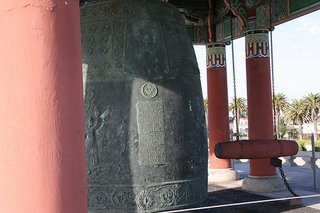
A good friend of mine commented on my post here, and so I'm posting my answer here. Here was the comment:
Mmm. What's your feelings on people's treatment of cockroaches when they don't go with the decor? :) Where does one draw the sacredness line on life?
I decide daily which lives around me will live, die, and how, and there's nothing anyone can really say about my choices without appealing to a Greater Principle.
Which is what ACS does daily, deciding whether a puppy should die rather than live a few months as a commodity.
Right?
Ok, first off, I admit that cockroaches rarely match one's decor. :) I think there are several issues to consider here. First, I think prevention is of utmost importance. There are recommendations out there that will help you prevent insect infestation. Proper prevention can go a long way toward eliminating having to make this decision at all. However, that's not always enough. So in the cases in which you find yourself living with a few cockroach friends, here are my thoughts.
Ideally, in the case of any unwanted house guest, one would do one's best to remove the guest without causing undue injury, releasing the animal outside. Unfortunately, cockroaches generally preclude this possibility. We all share this planet; but just as we would not be welcome in a lion pride's territory, cockroaches are generally unwelcome in our homes. Therefore, I understand the need to have them exterminated. However, I don't think that when we have to resort to extermination, we are necessarily drawing the line on sacredness of life at all. I admit that it is impossible not to kill every day. Every day in my life, I squish millions of small organisms as I walk. But in no way am I intending for this to happen. As a matter of fact, if it were up to me, I would go far out of my way to avoid killing any of them.
Just the other day, I was at the beach and there was this fly who kept landing on me. But it was the strangest thing—he woudn't fly away when I waved my hand at him, like most flies. He just stood there and let me touch him. I put my finger down, and he crawled onto it. I've honestly never seen anything like it before. After a while, he left, and I continued reading my book. A few minutes later I felt a tickle and I unconsciously swatted. Immediately, I realized what I had done, and I looked down and saw my little fly friend walking toward the shade with his right wing bent unnaturally back. A wave of sorrow and regret flooded over me for my lack of mindfulness. I had lost my concentration and swatted unconsciously, and it was 100% my fault that I injured the most peaceful fly I'd ever met. As he walked toward the shade, I remembered he would let me touch him. So I reached down and gently brushed his wing back to its normal position. It went back! But he continued walking toward the shade and, when he reached it, he just sat there. I felt sooo bad, just watching this fly. If he couldn't fly, he was going to die. I, honestly, could not go back to my book. I just sat there watching this fly. After about 3 minutes, he flew off! I was so relieved! That experience taught me a lot.
Back to our cockroach issue. If your house is infested, you have no choice but to exterminate them. They won't leave of their own accord, you cannot capture and release them (there's too many!), and they can impair your health. Thus, you have no choice. But there are an infinite number of mental states that can drive your decision to exterminate them. Many people, I expect, will simply call the exterminator without a second thought, and be glad that the roaches are dead. This view, I argue, is a case in which one does not view cockroach life as sacred. Me, personally, I would make that call with a heavy heart, and would be very sad at their death. I would perform my daily meditations keeping them in mind, wishing them well in their next lives. In my view, roaches are sacred, and I would treat them as such.
My friend said:
I decide daily which lives around me will live, die, and how, and there's nothing anyone can really say about my choices without appealing to a Greater Principle.
Yes, you do make those choices. But I'm not sure what you mean when you say there's nothing anyone can say about your choices without appealing to a Greater Principle. If you are trying to say something about a judgement of the ethics, or lack thereof, surrounding your actions, then that's something too long to handle in this post, but suffice it to say that such an article is already in the works. However, if you mean something else, I'm not following.
My friend said:
Which is what ACS does daily, deciding whether a puppy should die rather than live a few months as a commodity. Right?
Actually, no, not in the manner in which I think you are speaking. ACS will never euthanize an animal that is adoptable. What this means is that they will euthanize when an animal is very ill and is not going to recover, which in my view is a compassionate act. They will also euthanize an animal if it was, for instance, trained as a fighting dog and was not responding to rehabilitation, and was thus very dangerous to be around. That's it. Therefore, I don't think that what ACS does is "deciding whether a puppy should die rather than live a few months as a commodity." I think they do their utmost to keep animals alive and happy, and will resort to euthanasia only in the most extreme circumstances.
Thanks for the thought-provoking comment!






















